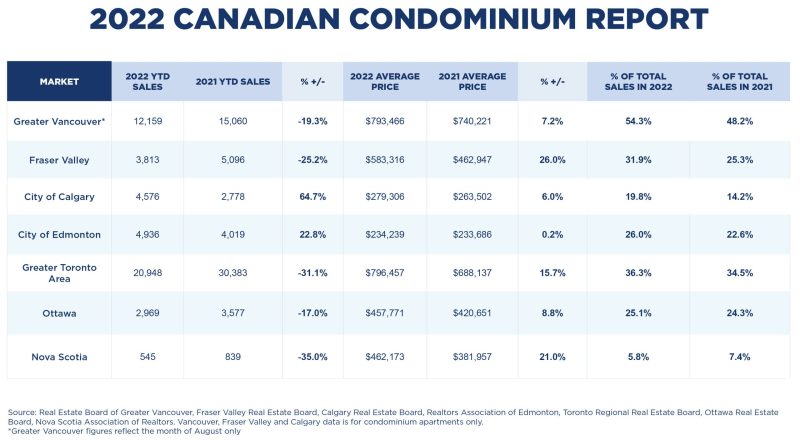Despite a late summer rebound in the condominium sector, buying activity in the Greater Toronto real estate market remains more than 30 per cent off last year’s robust levels. Between January and August of this year, almost 21,000 condominium apartments and townhomes were sold, a stark contrast to the 30,383 sales that occurred during the same period in 2021. Values, however, have trended higher in the GTA, with the average condo price now sitting at $796,457, up from $688,137 one year ago. While the most significant average price increases occurred during the heated first quarter of 2022, stability in the downtown core has likely been a factor in keeping values on even keel.
Many condominium properties that were listed for sale on the Toronto real estate market earlier in the year were de-listed, then re-listed as units for lease, to take advantage of the substantial upswing in rental rates. The average monthly cost of rent in Toronto continues to increase year-over-year, rising 17.1 per cent for a one-bedroom unit ($2,329) and 24.3 per cent for a two-bedroom unit ($3,266), according to the Rentals.ca August Report. This has served to reduce inventory and keep prices relatively stable, particularly in the sought-after Bay Street Corridor, Waterfront Communities (C01/C08), and the Annex/Yorkville areas.
Investors have re-entered the Toronto condominium market in recent months, looking at properties valued between $1 million and $2 million in the core. Many are cash buyers and prepared to move quickly when the right property comes along.
Affordable condominium product has also held steady, with demand in neighbourhoods such as Liberty Village a constant throughout the softening in the overall market. Apartments priced from $500,000 to $700,000 continue to experience the lion’s share of activity across the Greater Toronto real estate market. At the other end of the spectrum, some move-up activity is also occurring as condominium owners take advantage of the current lull to trade up to larger units, some within their existing buildings. Downsizing has also contributed to strength in some midtown markets. In Bedford Park-Nortown (C04), for instance, condominium developments along Avenue Road have resonated with empty nesters and retirees who like the convenience of condominium ownership in neighbourhoods that offer shops and restaurants within walking distance. However, pre-sale condominium construction is particularly challenged by the current environment. Builders who are too far invested are moving forward, but many of these buildings are now selling at $1,400 to $1,500 per square foot. This, at a time when the resale market rate is $1,100 per square foot. Development costs alone have risen an estimated 18 to 22 per cent in the past year.
With favourable population growth forecasts and limited inventory available for sale and lease, the condominium sector of the Greater Toronto real estate market is expected to remain relatively healthy, riding out the current turbulence until the market stabilizes and returns to more normal levels of activity.
Condominium Trends in the Canadian Real Estate Market
Condominium market share has grown in major urban Canadian real estate markets yet again this year, a reflection of new market realities and the shifting course of entry-level buyers. RE/MAX Canada’s 2022 Canadian Condominium Report examined more than 120 communities in six major markets, including Greater Vancouver/Fraser Valley, Calgary, Edmonton, Greater Toronto, Ottawa and Nova Scotia. The report found that condominium sales were down in the first eight months of 2022 in four markets, including Greater Vancouver/Fraser Valley, Greater Toronto, Ottawa and Nova Scotia, while Calgary and Edmonton reported double-digit sales increases over the same period in 2021. Condo values are up in almost all markets year-over-year, with many bolstered by a robust strong first quarter.
Condominium market share, as a proportion of total Canadian real estate sales, advanced across the board, with upswings reported in five out of six markets analyzed, ranging from a low of 0.08 per cent in Ottawa to a high of 6.6 per cent in the Fraser Valley. Compared to year-to-date levels one year ago, condominiums now represent just over 54 per cent of total residential sales in Greater Vancouver, 36.3 per cent of residential sales in the Greater Toronto Area, almost 32 per cent of sales in the Fraser Valley, just over one in four sales in Edmonton and Ottawa, and almost one in five sales in Calgary. Nova Scotia was the only market to register a decline in condominium market share.

“The affordability factor is the key issue in today’s housing market,” says Christopher Alexander, President, RE/MAX Canada. “Rising interest rates have slowly eroded purchasing power and, despite lower housing values and cooling market conditions, buying a house is more challenging now than ever before. For those who have adjusted expectations with every rate hike, the cost of carrying a mortgage versus renting is now more comparable, given sharp double-digit increases in rental rates throughout the major markets, but especially in BC and Ontario. So, while fewer sales have occurred in 2022, condominiums represented a greater proportion of overall sales, as buyers gravitated to affordable options to achieve home ownership.”
The post Toronto Real Estate: Condo Market Share Rises to 36.3% appeared first on RE/MAX Canada.
